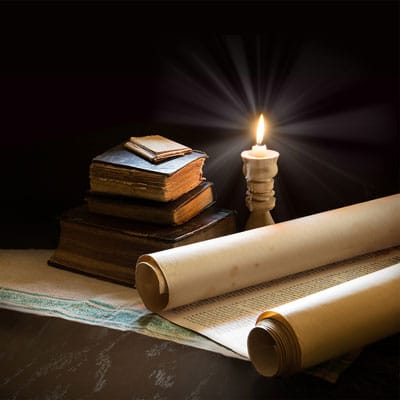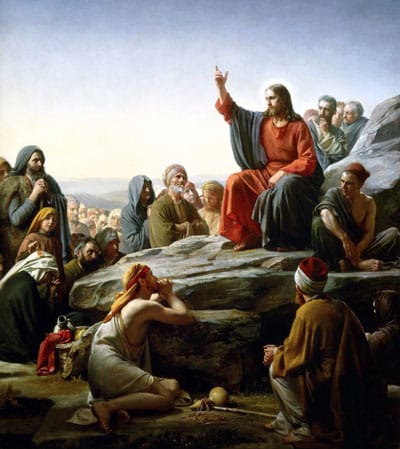
What is the history behind the process and practice of ordination? This page will explore the origins of ordination around the world and across various faith groups – and how it has changed over time.
In simple terms, ordination refers to the process of consecration, i.e., an individual being given the right to perform religious ceremonies. The process itself involves a variety of methods that can vary based on which denomination or religion is doing the ordaining.
How Ordination Began
Just about every religion involves two groups: leaders and followers. Leaders take on the study of the faith, submit wholeheartedly to its practices and principles, and dedicate themselves both to living in line with its teachings and helping others to follow them. Followers, on the other hand, look to leaders for wisdom, guidance, and assistance.
But how does one distinguish between leaders and followers? By necessity, each religion had to develop its own distinct avenues or processes for individuals who felt called to enter leadership positions to complete in order to make that transformation. Candidates for ordination are often referred to as ordinands.
Once confirmed as clergy members, these individuals are set apart from the rest, elevated to a higher level, and typically granted special authority to officiate religious rites and ceremonies.
The tasks required of those who complete this consecration process (and the title granted to them afterward) varies from one religion to the next, but the general concept remains the same across belief systems.
Further, some religious organizations have deep hierarchies by which clergy members can continue climbing the ranks of leadership. Others have more even hierarchies (or no hierarchies at all), which favors a more egalitarian view of spiritual leadership.
Become Ordained Online
A major catalyst for the growth of non-traditional forms of ministry are online churches like the Universal Life Church. These modern takes on ministry, typically unassociated with any particular denomination or institution, tend to have a different approach to the ordination process.
The Universal Life Church is a nondenominational religious organization best known for knocking down all formal barriers to ordination, allowing anyone who feels so-called to become an ordained minister via the internet in just a matter of minutes. ULC ministers enjoy all the same powers and privileges as members of the clergy ordained by more traditional faith groups, granting them the authority to perform many types of religious and legal ceremonies – including weddings. If you’d like to get ordained, the process takes only a few minutes to complete. Just click the button below to get started!
Ordination in the Christian Church
Ordination in the Christian Church is the process by which individuals are appointed or set apart for a specific ministry, such as pastors, deacons, or priests. The practice of ordination has evolved over the centuries, and different Christian denominations have different practices, but there are some commonalities that can be traced back to the early Church.
History of Christian Ordination
In the New Testament, the apostles were chosen by Jesus and given the authority to preach, teach, and heal. They, in turn, appointed others to serve in leadership roles, such as elders and deacons, and laid their hands on them to impart the Holy Spirit and authorize their ministry. This practice of laying on of hands, which is still used in many denominations today, was seen as a way of passing on the apostolic authority to future generations.
Over time, the roles of bishops, priests, and deacons developed, and the ordination process became more formalized. In the early Church, ordination was usually done by the local bishop, who laid his hands on the candidate and prayed for the Holy Spirit to come upon him. As the Church grew and became more organized, regional and national councils were convened to establish rules and standards for ordination.
During the Middle Ages, the Church became more hierarchical, and the power of the bishop increased. Priests were ordained by bishops, and bishops were consecrated by other bishops in a long chain of succession that traced back to the apostles. This system of apostolic succession, which is still important in some denominations, was seen as a way of ensuring the continuity and authority of the Church.
The Protestant Reformation brought significant changes to the ordination process. Reformers like Martin Luther and John Calvin rejected the idea of apostolic succession and emphasized the idea of “a priesthood of all believers.” They saw ordination as a recognition of a person's calling to ministry, rather than a conferral of special authority or powers. This principle lives on in many Christian denominations to this day. Some Protestant denominations, such as the Quakers, do not practice formal ordination at all.

Christian Ordination Process
In most Christian denominations, the ordination process involves several steps. First, the candidate must discern a calling to ministry and complete a course of study, usually at a seminary or divinity school. This includes theological education as well as practical training in pastoral care, preaching, and leadership.
Once the candidate has completed the educational requirements, he or she is usually ordained by a bishop or other authorized leader. The ordination service typically involves laying on of hands, prayers, and vows of commitment to the ministry. The newly ordained minister may be given a stole or other vestments as a symbol of his or her office.
In some denominations, such as the Roman Catholic Church, ordination is a sacrament and is therefore considered to confer a special grace or spiritual power on the ordained person. In others, such as the United Methodist Church, ordination is seen as a recognition of the candidate's gifts and calling rather than a conferral of special powers.
While most commonly associated with Christianity, ordination is practiced in many other religions, too.
Ordination in Buddhism
In Buddhism, ordination is the process by which one becomes a monk or nun. The process usually involves taking vows of celibacy, non-harm, and renunciation of material possessions. The candidate may spend a period of time as a novice before being fully ordained, and the ceremony may include the recitation of prayers and the taking of vows in the presence of a community of monks or nuns.
Ordination in Judaism
In Judaism, ordination is the process by which one becomes a rabbi. The process typically involves years of study at a yeshiva, followed by an examination and the conferral of a degree. The candidate may then be ordained by a panel of rabbis in a ceremony that includes the laying on of hands, the recitation of prayers, and the presentation of a certificate of ordination.
Ordination in Islam
Islam takes a different approach. For followers of the Muslim faith, there is no formal ordination process for imams or religious leaders. Instead, religious authority is based on knowledge, piety, and the ability to lead and guide the community. Scholars may attend Islamic universities or study with a respected teacher, and they may be recognized as authorities based on their knowledge and reputation. Mosques may also have a committee or board that oversees the selection and appointment of imams.
How Ordination Has Evolved Over Time
The history of ordination is, in many ways, a history of evolving societal beliefs and views. Over the centuries, there have been significant changes to the ordination process; some of these changes reflect shifts in theology or practice, while others reflect broader cultural and social changes.
One of the most consequential changes in recent years has been the increasing number of women and people of color who are becoming ordained in many denominations. While there are still some denominations that do not ordain women, the trend towards greater inclusivity and diversity in ministry is growing.
Many people who have faced historic (or continued) discrimination in their pursuit of ordained ministry have found the Universal Life Church’s open and online model to be a valuable alternative avenue. To follow in their footsteps, click the button below.

